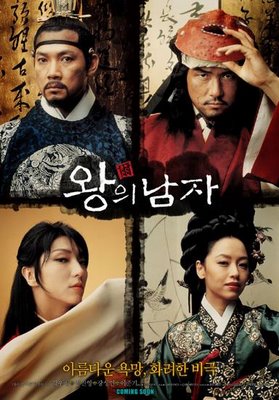Uang Eui Nam Ja

Listening to the song "Yin Yuan" from a korean movie Uang Eui Nam Ja which means Wang De Nan Ren (The King's Man). I mentioned in a few entries ago how i hope tis show will come to Singapore, but i tink it won't la.. If the pcit above turn out fine...the top left is King Yonsan, top rite is Chang Sheng. Bottom left is the guy-look-like-gal Kong Ji and the last is concubine Zhang Lu Shui.
The King and the Clown Is Story of Everyman (2005/12/22)
by Seung-Jae Lee
"The King and the Clown" is a very substantial movie. Taking even one scene out would be as dangerous as carving out a crucial organ from your body.This movie teaches a lesson to the current filmmaking industry that is nearly choking with big words such as "visuals", "style", "actors' guarantees worth over 400 million won", "productions costs that exceed 10 billion won", "filming in foreign locations", and "star directors". The lesson is the importance of the "basics".
The movie's plot takes place during the Joseon Dynasty. Jang-saeng (played by Kam Woo-seong) is a clown in the Namsadang troupe who abandons his troupe after realizing that it had degenerated into a plaything for the aristocrats. With a fellow clown named Gong-gil (played by Lee Joon-ki), whom he loves deep in his heart, Jang-saeng leaves for Hanyang for a new life. There he leads a show troupe and with his exceptional talent makes the troupe famous with a show that satirizes King Yeonsan (played by Jeonng Jin-yeong) and his favorite concubine, Nok-su (played by Kang Seong-yeon). King Yeonsan, who happens to see to the show, falls in love with the performance and provides living quarters for the clowns in the palace. He soon starts to cast amorous glances at Gong-gil, however, which causes Nok-su to fall into a jealous rage and devise an evil plot.
It is true that the phrase, "theatrical" has been used in a negative sense meaning "unrealistically exaggerated", but "The King and the Clown" completely twists around the meaning of this phrase. This film is very "theatrical" in the sense that it has an absorption force so strong there is no time to question its reality. Based on "You (Yi)", the highly acclaimed play that received many awards since its first performance in 2000, the movie more than exceeded the quality of the play by wisely applying the original work's scenario and dialogue, knowing what to put in and what to leave out.
Like the risky tightrope dancing performed by Jang-saeng and Gong-gil, this movie successfully walks the tightrope between jest and pathos, as well as between the hunger for power and the hunger for love. The last scene in which the two clowns walk on the tightrope together may well be the "last scene of the year". The complicated love relationship that occurs between Jang-saeng, Gong-il and King Yeonsan goes beyond being a "special", homosexual love and reaches the viewers as a "universal" concept of sad love. This is because the movie touches the sentiments of the viewers, teaching us that happiness and sorrow are, after all, twins that come from the same source.
The shows performed by Jang-saeng's troupe and the doll play that Gong-gil performs for King Yeonsan are enjoyable in themselves as "plays within plays". These scenes gradually blend into the main story, sometimes becoming a testimony to the characters' emotions and sometimes predicting the characters' fate. It is unbelievable that such a masterpiece could have been made with "only" 4.4 billion won. Moreover, the visuals in this movie bear a life of their own, due to the truthful directing that aims to dig into the deepest aspects of the characters' emotions.
Lee Joon-ki, the mysteriously beautiful man, shows amazing freshness, and Kam Woo-seong's distinct phonation especially shines in this period film. Jeong Jin-yeong, always as good as usual though never gaining much attention, effectively reinvented the insane king by overwhelming the audience with an intensely expressionless face that looks ready to explode at any minute. The powerful force that comes from their acts makes it impossible for the audience to hate a single character in the movie. Perhaps all men in the world, whether good or bad, live like the men in "The King and the Clown", harboring a patch of sorrow and remorse within their hearts.
⊙剧情简介:
身为贱民的艺人孔吉和长生原本是在市集小有名气的杂耍艺人,因为不肯加入当地的艺人团而与人结怨,继而来到京城汉阳。此时暴君燕山宠爱艺妓张绿水,朝纲混乱,贪官污吏横行。
长生与孔吉二人在街头开始表演讽刺燕山王和张绿水的喜剧,大受欢迎的同时被朝中官员以对王不敬的罪名抓捕,在被杖刑时长生无畏的大声斥责官员昏庸,却因此被该大臣释放,并要求他们去大王面前表演。原因是在他们之前有许多艺人在王面前表演,全都因为害怕王的威严(残暴)而表演僵硬无法使王露出笑容,许多人因此受罚,大臣希望俩人能让王开心。俩人在表演时也不能让王露出笑容,最后向来斯文的孔吉却急中生智的表演让王大笑,俩人随即被王留在宫中取乐,孔吉更是因为美貌令王倍加宠爱。
然而,大臣要求他们利用机会不断向王进谏,不久二人排演一段后宫女人因为嫉妒而互相残害的剧目,不料令燕山想起当年自己生母也是遭遇嫉妒而被毒杀之事凶性大发,当即杀死了两个后宫,于是宫中传出了戏子诱惑王残杀的传言。虽然受到王的宠爱,但是被称为戏子的他们在宫中毫无地位可言,孔吉用献出身体的代价成为了喜乐堂的主人,得到燕山御赐的“肆身横宽”的殊荣,并将喜乐堂并入政府管理……
⊙华丽而悲凉的人生故事:
朝鲜最早的宫廷小丑,因为嫉妒和欲望而招来杀身之祸,流血的悲剧开始上演。。。美丽的欲望,华丽的悲剧,玩弄于皇帝,电影以朝鲜时代的宫廷为背景,刻画了宫廷小丑们的一场玩耍剧。
《王的男人》这部电影展现了他们不同的面目,只有把历史事实和电影丰富的想象力重新组合才使该片成为故事情节紧张刺激的一部电影。在燕山君的日记上只轻描淡写一行带过的小丑们,成为该片中让皇帝又笑又哭的主人公,在历史和虚构之间穿梭往返、津津有味地展开故事的《王的男人》,因为围绕着燕山君和小丑们展开的阴谋发展情节而使角色们的命运急促悲凉和悲剧的最高境界。
推荐指数:★★★★★<
**my frens all saying they want a REAL synopsis..ok lo..hahaha..found one


No comments:
Post a Comment